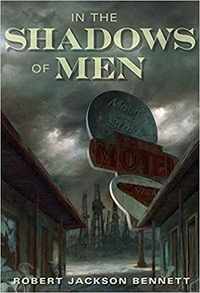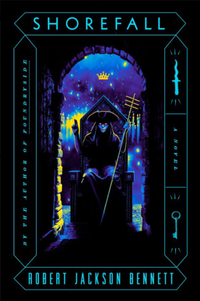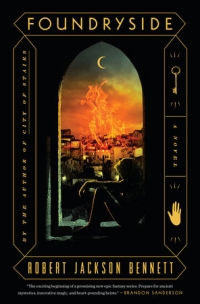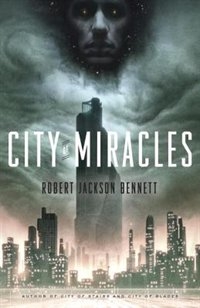Locklands by Robert Jackson Bennett
 Friday, July 15, 2022 at 7:07AM
Friday, July 15, 2022 at 7:07AM 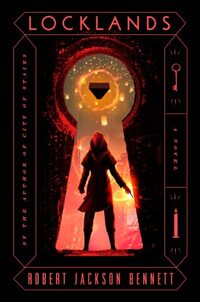
Published by Del Rey on June 28, 2022
Locklands is the concluding novel of the Founders trilogy, following Foundryside and Shorefall. The central characters have established a new settlement called Giva that they enshroud in fog as they advance their war with Tevanne, trying to save as many people from conquest and slavery as they can. None of this will make much sense to readers who jump into Locklands without reading the first two novels.
Using the magic/technology of scriving, key characters are “twinned” with each other, sharing their thoughts as if they were inhabiting the same body. The same scriving allows multiple characters to join in something like a group chat. This might be the only way that people can truly understand each other and thus the only way to overcome mindless hate. Unfortunately, scriving only exists in fantasy.
We learn more in Locklands about the relationship between Clef and his son Crasedes, a father-son tragedy that departs from literary tradition by basin gtheir conflict on the desire to alter reality (although, in a less literal sense, that might be something that underlies most parental-child conflicts). Building on that foundation, Tevanne now wants to open a door into the substructure of reality, the boiler room holding the machinery that defines the reality we perceive. Tevanne’s plan is to force a reboot with the expectation that God will do it right the second time. Wiping out reality as a solution to humanity’s problems seems extreme, but Tevanne is one of the hierophants who shaped the current reality with scriving so he has a bit of a god complex.
The plot is an action/quest story that has central characters (led by Sancia, the first significant character we meet in the trilogy) venturing into battle to thwart Tevanne’s plan. The novel ends with an epic battle between Clef, Crasedes, and Tevanne. Other characters step into the battle as needed to secure a victory. Despite bogging down from time to time, the story reaches a satisfying conclusion.
Most central characters undergo a transformation over the course of the trilogy. Crasedes, who starts as more of a legend than an actual character, is given a meaningful role in Locklands, a role that has him seeking atonement. Clef starts the trilogy as a sentient but sleeping key, turns into a more substantial character who can’t remember much of his past, and regains those memories (for better or worse) in Locklands. Clef’s story is also one of atonement.
The need to sacrifice for the greater good is a constant theme in the trilogy. Several characters make sacrifices in Locklands: Beatrice, Sancia’s lover and partner, sacrifices the architecture of her relationship with Sancia; Sancia, who sacrificed some years from her life in the last novel, joins Clef in making a life-altering sacrifice that seems to have been destined since the first novel.
The grand lesson of this trilogy is that love conquers all — or more specifically, that we can’t fix the world by meddling with reality because “a better world can only be brought by what we give to one another, and nothing more.” A debatable proposition, but it’s fair to say that destroying reality and hoping God will build a better one isn’t a smart solution to humanity’s problems.
Characters have an annoying tendency to say “Oh no. Oh, no, no, no” every time they face adversity. The novel has too many hokey moments as characters embrace and profess their love before stepping into danger. The book is needlessly wordy, perhaps a hundred pages longer than it needs to be, but it does bring the trilogy to an exciting conclusion.
RECOMMENDED
